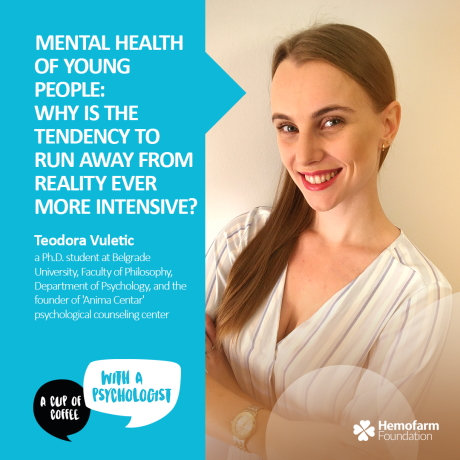
18/11/2022
Mental health of young people
Teodora Vuletić
PhD student at Belgrade University, Faculty of Philosophy, Department of Psychology, and the founder of Anima Centar psychological counselling centre
Mental health of young people
‘What’s your problem? Your only responsibility is to study.’ ‘Come on, snap out of it, you’ve got a whole life ahead of you!’ ‘Everything is easier when you’re young.’ These are just some of the sentences that young people hear on a daily basis when they face crisis situations. The category of young people is often considered resilient to psychological problems, probably because of the notion of their vitality and possibility to quickly ‘stand back on their feet’. However, results of numerous research works worldwide, including Serbia, reveal that mental health of young people is seriously in peril. The situation had not been much better before the onset of COVID-19 pandemic, which considerably came in the way of their needs and revealed some latent, hidden problems. Hampering the exchange with their peers have led to intensified feeling of loneliness, depression and peevishness. Now we have a worrying situation in which suicide is one of the most frequent causes of death among the young generation group.
The period of adolescence is usually determined as the age that comes after childhood (about 14 years of age), up to the time of assuming responsibilities of the adult age (up to 30 years of age). The array of terms (adolescents, teenagers, youth, young people, adults, etc.) used for closer age determination of the young people group we are talking about, is indicative of its heterogeneity. Within these sub-groups, young people face different developmental tasks and challenges life sets before them, which are important to take into consideration in designing adequate practical interventions and valid psychological research.
Environment in which young people are in search of ‘their own place’
Young people in Serbia share lots of similar things with their peers worldwide, yet they have some specific features, too. Teenagers will, for instance, wage their war in the field of self-confidence and the ‘Who am I?’ riddle, while young adults will face the issue of separating from their parents and starting their own family. These are to some extent archetypical motives, presented through myths and fairy tales on growing up, and as such, they are not absent in modern stories either e.g., the Netflix series ‘Stranger Things’). These developmental tasks connect young people through time and space. On the other hand, each culture has its own specific features, which shape the way in which young people get to know the world. Their challenges will therefore differ depending on whether (and to what extent) certain environment is open for changes and what values are dominant in it. Serbia is considered to be a society in transition, in a long-term process of transition from socialist to neoliberal ideology. Therefore, one of the basic tasks of young people – the search for their own Self, is encumbered by the pressure to find their identity in this sea of the so-called derivatives – individualist (consumerism, freedom of choice, etc.) and traditional and collectivistic values (communism, nationalism, etc.).
Development of young people in the times of ‘neglected’ values
Values, as something that people strive for, something that has a positive connotation and something that largely determines our behaviour, depend on the culture within the frame of which they are observed. If we observe Serbia as a society in transition, we are going to find it difficult to determine the values which are appreciated at the level of the society, as well as if they are neglected or respected. Expansion of social networks and ‘reality’ programmes creates a picture of young people as population which incline towards superficial values, such as distorted standards of beauty and entering into short-lived carnal relationships. The advance of technology especially increases the generation gap and older adults have an impression that young people are on the wrong track. Thus, it is often neglected that it is the young people who promote important ideas on social networks (e.g. ‘body positivity’) and that they can find support groups with their peers who are struggling with similar problems. Taking into account the turbulences characteristic of young age, including the psycho-physical changes, building a positive image of oneself has always been challenged by various risks. However, it seems that presence on social networks has made these risks more transparent... It is difficult to say what is right for young people. Even Socrates was often accused of spoiling the youth in his time. After all, symptoms of an individual are also a reflection of society. Therefore, the question of what purpose the contents preferred by young people serve and what gaps they fill in their lives seems to be more relevant.
Mental health of young people and stigma
We often address the question on why young people do not talk about psychological problems. It is possible that they feel alone in their problems, they worry if they might be stigmatised as ‘psychos’, which might have an impact on their future and their career, as well as that they might be left on their own, which usually means without support of their friends and partners. Parents often have the same fears for their children, which increases the risk of (auto)stigmatisation and reduces the likelihood of young people actually turning for professional help. On the other hand, confiding problems to parents, might be accompanied by the fear of young people that their problems will become real and that they will not be able to hide from them by running away into fantasy (watching films, series, or some other programmes). In addition, parents and relatives tend to say the sentences quoted at the beginning of this text, in order to convince themselves and their children that everything will be all right. Unfortunately, this sweeps the real causes of problems of young people under the carpet. The feeling that there is no way out leads to helplessness, depressive tendencies, anxiety, and various other problems and risky behaviours. Problems are often suppressed or torn off from the conscious, and psychological reality thus attains a distorted image. Young people then reflect themselves against this picture, many of them transfer their problems into their adult age, and this is how we get a vicious circle.
Mental health of young people is jeopardised, and it seems that their inclination to run away from reality has become more and more intensive. They are calling for help through various means, and the question is whether we can hear such pleas and whether we are open for the language they speak. They can send us direct messages (‘I don’t feel well’), indirect messages (e.g., undernourishment), or messages they themselves are not aware of (bodily pain, in place of facing their feelings). If we wish to do something to mend the current situation, we have to consider it from different positions of knowledge: what young people objectively need and would it be good (essentialist position), what they believe they need (phenomenological position), and how their mental health is affected by the culturological frame in which they are growing up (socio-constructionist position). This is undoubtedly demanding an interdisciplinary approach and a genuinely emphatic attitude of adults who are in any position of power.

AUTHOR
Teodora Vuletić
PhD student at Belgrade University, Faculty of Philosophy, Department of Psychology, and the founder of Anima Centar psychological counselling centre